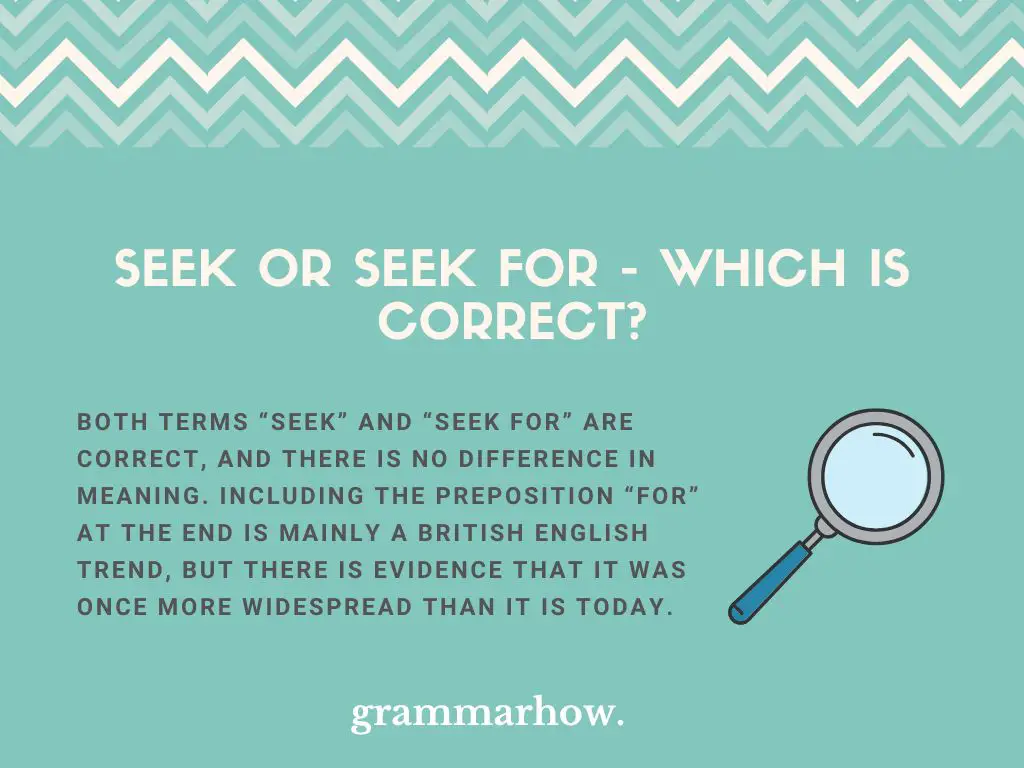The word “seek”, which means “to look for”, often generates debate because some people use it with a preposition at the end, whilst others feel it is unnecessary. This page explains whether or not it is ok to use “seek” with a preposition at the end.
Seek or Seek for – Which Is Correct?
Both terms “seek” and “seek for” are correct, and there is no difference in meaning. Including the preposition “for” at the end is mainly a British English trend, but there is evidence that it was once more widespread than it is today.

The Oxford Dictionary lists the word “seek”, and on the entry, there are examples of the term “seek for”, which indicates that it is a valid term.
Some people feel it is unnecessary to include “for” because the word “seek” means “to look for”, so simply by using “seek”, you are already implying that you are looking “for” something. Hence, to some, this renders the inclusion of “for” unnecessary.
Furthermore, Google Ngram reveals that the term “seek for” was once far more popular than it is today. This trend indicates that its usage has declined because of the streamlining or simplifying of certain phrases over time rather than the presence of an error.
Seek
TheOxford Dictionary defines “seek” as the action of looking for something or trying to achieve a particular goal.
The word “seek” essentially means to “look for” or “aim for”, and it is used to refer to a wide range of situations.
Here are some examples of “seek” in a sentence:
- I will seek help from my boss because I don’t know what I am doing.
- I went to seek advice from my best friend because she is very level-headed.
- If I need to seek guidance, I always go to my mother.
- I am seeking a new job at the moment.
Seek for
The formation of “seek” with the preposition “for” is cited in the Oxford Dictionary as a UK term, although you will also see it outside the UK.
The term “seek for” is the same as the term “look for” or “aim for.” The inclusion of the preposition does not change the meaning of the term.
Using the word “for” with “seek” is not considered necessary by many people, and its appearance in literature has declined over the last century.
Here are some examples of “seek for” in a sentence:
- I have been seeking for help all day, but nobody is willing to help me.
- If you seek for advice, you can always ask me.
- When seeking for a job, it is best to apply to lots at the same time.
- If you are seeking for guidance on the application process, please contact us.
Conclusion
The word “seek” is more commonly used without prepositions than it is with them. However, it is not incorrect to say “seek for”, despite what some might say to the contrary.
The use of “seek for” can be traced back centuries, and the term even appears in popular literature by authors such as Shakespeare. Including “for” does not change the meaning of “seek”; the two phrases are essentially the same.

Martin holds a Master’s degree in Finance and International Business. He has six years of experience in professional communication with clients, executives, and colleagues. Furthermore, he has teaching experience from Aarhus University. Martin has been featured as an expert in communication and teaching on Forbes and Shopify. Read more about Martin here.
